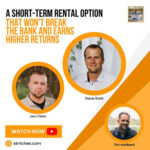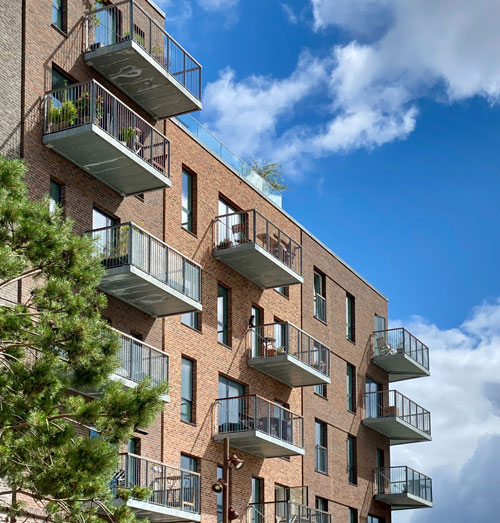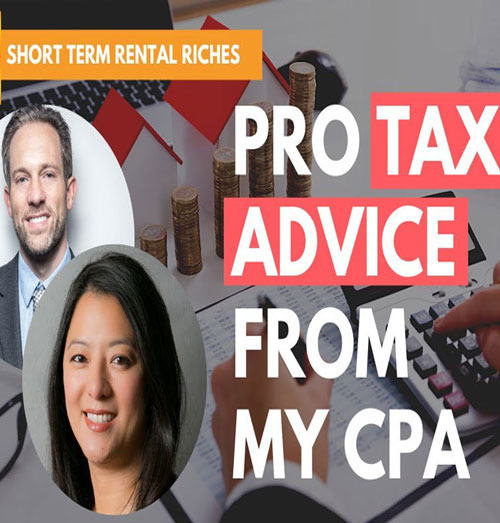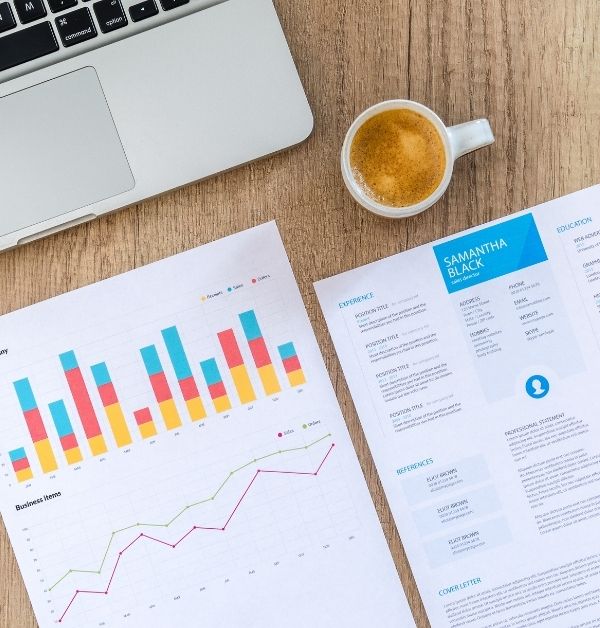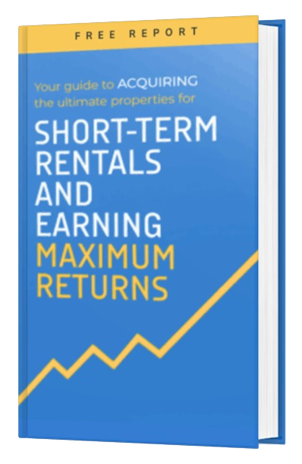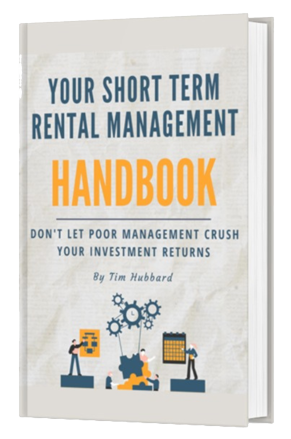How to build an Airbnb Business: Cash on Cash Returns Explained
One of the upsides to real estate investing vs. other investments, stocks for example, is that with real estate we can know when we buy a property if it’s a good investment or not. It all comes down to the numbers. While there are a lot of metrics out there to compare investments there are a few that are more important and one in particular that every conservative investor should have in their tool belt.
If I had to choose just one metric, it would be the Cash-on-Cash (COC) return. This tells us how much cash we are actually making at the end of the day–which, to me as a conservative investor, is always more important than what we could make. By investing for appreciation for example.
In our current economic environment you can pretty much kiss your appreciation returns goodbye since the market is dropping. BUT we can still find properties that earn a good return and to do that we will need to fully understand the COC metric.
To take it one step further, as short-term rental investors, we need to add in a few items to make sure that we are accurately calculating our potential returns.
Let’s break that all down this week to make sure you are not getting into a deal that doesn’t make sense.
- What is the cash on cash return?
- An easy example
- Historic averages
- Today’s averages
- Why the annualized COC return is important
- Why CAP rates are not as useful.
Are you enjoying the podcast? Please subscribe, leave a rating and a review, and share it! This helps us reach others that may find the info helpful as well.
Get a copy of my 12 proven house rules to protect your property from almost every negative situation (highly recommended)
You can find all of our links here including our website, recommended resources, upcoming live events, short-term rental playbook, Instagram, and more!
Click Here to view TranscriptSo, there are a lot of metrics out there for us to be able to analyze our properties to know if they are a good return or not. But I have one favorite and one that all of you should be using, I want to break that down this week.
Welcome to short-term rental riches will discuss investing in real estate but with a specific focus on short-term rentals quick actionable items to acquire manage and scale your portfolio. I’m your host Tim Hubbard.
Welcome back to the short-term rental riches podcast. I am happy you are here and it is a new year, isn’t it 20-23? Gosh. Every time we add a year on it, it feels like questions that further in the future. Well, I hope you have some great goals lined up and hopefully you don’t leave them until the end or the beginning of every year to create them and to think about them and to plan for them because goal planning is something we should be doing all year long.
And the sad truth is that most people spend more time planning their vacations, which is good for us as short-term rental investors. But most people spend more time planning their vacations than they do their lives and that is the sad truth. So, I hope you have some great goals lined up for the next year. Okay. Without further Ado, I want to talk about a metric that we should all be using every time we purchase an investment property or anytime were thinking about purchasing an investment property and there’s a lot to different metrics out there, but the cash-on-cash return in my opinion is the most important because we want to invest for cash flow, that’s something we can do right?
From the moment we purchase a property if it’s already occupied versus other types of Investments stocks, for example, so we don’t know how stocks are going to perform in the future. We like to think we know where they’re going, but the reality is that’s way out of our control versus Real Estate or we have control over our properties. And so, I always recommend that we know exactly what we’re getting into when we buy a property and we don’t speculate on appreciation. Now, I know in today’s economy. Appreciation is not really happening right? In fact, it’s going the opposite way and homes are decreasing in value. So hopefully you weren’t Investing for Creation, there are still properties out there where we can cash flow and that is the name of the game, right? It doesn’t matter what happens to the value of our property, if we’re making money on it month. After month, in our expenses are fixed.
So, I want to talk about how to calculate that, some considerations, and let’s just go from start to finish. So, first of all, what is our cash-on-cash return? Well, it’s how much cash we get back versus how much we invested in the property. Now, there’s actually multiple ways to do. This right, we need a timeline to be able to calculate the cash-on-cash return, but I’ll talk about the most normal way to that first, and that’s based on a year-long time period.
So, if we’re going to buy a property, we first need to know all of the income that it’s either making right now if it’s already rented or what we are, projecting into the future. And now, I recommend being very, very conservative with our rent projections. Remember, we can use tools, like are DNA all the rooms there’s data. From Beyond pricing and price labs.com, if you’re using any of those pricing tools. So, we can get an estimated amount of short-term rental income in the future, but remember, it’s not guaranteed versus if we’re buying traditional, rental property that already has a long-term tenant in there and they’re already paying monthly amount and as you know if you’ve been listening to podcast for a while that is my Ultimate Backup plan. So that’s how I underwrite it just start off with.
So first we need to know all of the income if it is a long-term rental than, you know. Any monthly fees on top of the short-term rental, maybe you’re charging back for utilities or something like that. It’s a short-term rental. Well, then we have our estimated short-term income. We also have our cleaning fees, pet fees, anything else. You might think you might be able to collect from that property, then afterwards, we need to deduct all of our expenses, right? So, if it’s a long-term rental, we’re going to be deducting. Maybe management fees were very likely going to have very little utilities but maybe Landscaping Pest Management versus a short. Terminal, we have much more expenses, right? So, we definitely have utilities. We have Internet, we have HOA fees. If we happen to be in a place that has HOA. We have Landscaping, we have maintenance costs.
Remember, if you’re buying an older property, you always want to estimate higher maintenance cost, because older properties. Well, they don’t hold up usually, as well as newer properties, right? So, you want to make sure that you have an expense in there for maintenance. We were going to take all those expenses and them from our income. So, remember your biggest expense is though, no matter whether it’s a short-term rental or a long-term rental are going to be your property, taxes, your insurance and your mortgage. If you have a loan on the property, but remember the principal pay down that happens every month, every time a mortgage payment gets made, that’s not action expense, right? So, you want to make sure that you take that out. That’s one of the beautiful things about real estate is that our short-term rental gas or our long-term tenants are actually paying down. On our properties for us, right? So hopefully at the end of the day, after all those expenses, you have net income left over.
That is the name of the game. That’s what we strive for, not appreciation, not speculation. And I heard it said really well, recently, is that if we’re investing based on probabilities, right? So, a conservative rent estimate and accurate expense estimates. Those are probabilities versus possibilities and that’s thinking, oh, I can improve this. Property whole bunch and I’m going to double the short-term rental rent. That’s going to come in. That is a probability which we could. In other words, call speculation right now past performance is never a guarantee of future performance, but it’s definitely a lot more probable than just thinking. We can do much, much better than some property did in the past, right?
We covered a lot of topics on this podcast and a quick action will bite size format. So, you have the tools to acquire and improve your short-term rentals on your own. But if you want to go deeper, I have a special invite for you. Join us once a month that are rested, investor Clubhouse, where we go in-depth on an individual topic, everything from analyzing properties to improving operations and our bottom line, we cover it all the clubhouse members and myself are sharing best practices to earn the most revenue with the least amount of headache and I would love to have you there as well. That’s restmethods.com forward slash Rich. Our lives are shaped by those. We spend the most time with. So, if you want to take your STR to the next level. Come join us. I hope to see you on the inside.
Okay, so we take in all of our expenses and deducted from all of our income and hopefully we have net income left at the end of the day. Now, the cash on cash, return calculation happens here, right? So, let’s say a quick example. Let’s say you bought a property for a hundred thousand dollars. I know those probably do not exist, right? And you put 20,000 dollars down as a down payment and then throughout the year, your mortgage or Insurance, your utility is whatever happened to be cost you another ten thousand dollars. So, this hundred-thousand-dollar property. You have a total of thirty thousand dollars in cash out of pocket into the property now. Let’s say that after all those expenses you made a net profit of 10 thousand dollars, that would be really good. By the way, that would be a cash-on-cash return of about, 33.33% right. It cost you thirty thousand dollars to get about property and you made a third of that back in the first year. That’s pretty darn good.
Now let’s talk about what you should actually expect for cash-on-cash return. Let’s start with long-term rentals. It used to be in the not-so-distant past that you might be earning single digits. If you’re in a decent Market, we used to strive for ten percent, maybe 34 years ago, but that just became less and less even with lower interest rates in the recent past. Now, I would say, unfortunately again, all markets are different, but you’re probably looking at like a zero percent. Cash on cash return with these long-term rentals. Again, that is not for every Market. I know there’s always opportunities but interest rates have doubled and if cash on cash returns just recently, six months a year ago were very low to begin with. Well then, they’re probably zero or even – now remember, the cash on cash. Learn is not accounting for tax benefits. And so, we know, as Real Estate Investors that we have some really fabulous tax incentives.
If you don’t know about them, please go back and check out some of the prior episodes. You’ve got one with Tom wheelwright, who’s Robert Kiyosaki’s accountant and you can check out his advice. We’ve got one with my accountant, a little further back. And so, we talk about that topic quite a bit. I am not a tax professional, but they are and we’ve got it on this channel for you.
Now, what should we expect as a short-term rental cash-on-cash return. Well, I will tell you that I have properties of ranged everywhere from 20% per year to over 50%, and I still have properties doing that. Well, we’ve got to remember though, when we invest in short-term rentals, we have more upfront investment normally, right? So, we have to buy furniture, sometimes we’re renovating the property a little nicer, than maybe we would if it was a long-term rental and so because we’re investing more cash up front. That means Our first year of cash-on-cash return is very likely going to be a little bit lower, but this is the thing about cash-on-cash returns, we don’t just have to use them for a year-long period, right?
So, if we take that same example, where we just talked about the 33 percent cash on cash return in year one, and we spread this out over a two-year period. For example, let’s calculate this one. So, let’s say we still have the 30,000 that we invested in the first-year terms of expenses and down payment and we made 10,000 that first year, right? So, we’ve got a lot of upfront costs with a short-term rental, right? So, let’s take the same calculation over two years and let’s say, in year two, we had an additional 10,000 dollars in expenses, just like we did in year one in terms of utilities and property insurance and taxes, but after all that we made an additional 10,000 dollars in net income. So now we have a total of forty thousand dollars in cash. Out of out of pocket, right? Twenty thousand dollars in expenses, over the two years and twenty thousand dollars as a down payment, but we’ve netted 20,000 dollars after those two years.
So, if we take the, the annualized, cash on cash return over the two years, that’s 50%, that’s really good, right? So, you can see that was short term rentals a lot of times. In the second year our cash-on-cash return, can go up quite a bit because we don’t have that original investment in Furniture. So, I recommend that you run your projections, not just on the first. Year, but also on the second and third, and fourth years as well.
A couple other things here, let’s say your cash on cash. Return is 0%. Remember if you’re getting those tax benefits and you save 10% off of your taxes from expenses eligible expenses from your real estate that you can use to offset other income. Well, that could still be a really good return for you so you definitely want to make sure that you’re considering those as well. Let’s talk about loan impacts for a second here. To we all know that interest rates are Going up. What does that do to our cash-on-cash return? Well, if our loan costs doubles, that’s going to mean our expenses are mortgage payments. Going to go way up, that’s going to put downward pressure on our cash-on-cash returns, right? But we still need this metric to know and to be comfortable with the property before we pull the trigger on it because it’s going to help us calculate that. But one metric you might hear out there in the real estate world. That doesn’t actually account for mortgages is the cap rate.
So, I remember Using the cap rate, a whole bunch. When I used to work as a commercial broker and it’s still a very valuable metric and it’s more often used with larger apartment complexes and shopping centers and much bigger deals, but it doesn’t actually account for debt, right? The cap rate is basically the net income divided by the purchase, price of the property and the net income is not accounting for mortgage, so don’t get caught up and be using a cap rate to calculate your potential. With the property, we want to be using cash and cash return.
Assuming you are using a loan to purchase the property, so make sure that your property makes sense when you’re buying it, right? That is most important thing. The value isn’t going to matter as long as our costs are fixed, right? As long as we have a fixed mortgage payment, if after all your expenses, you are making positive cash flow will, then I would consider that investment. Remember, every Market is different, so, there’s Is opportunities out there, but this is a metric that can really tell you if it’s worth moving forward or not.
I’ll leave you with just one last thing. That’s really exciting about real estate. We might not have this opportunity in the near future but it is an opportunity and the longer we hold real estate. If we can write out the lows, then we earn equity in our property, right? As we’re paying it down. Hopefully, we’re in a market that’s still growing and we can earn appreciation. When the It is going in the right direction and assuming those things are happening and we can refinance our property in the future. When we do have equity in it, we can take cash out a Cash out, refinance, which means what happens to your cash-on-cash return. If you take all of your cash out or even half of it through a Cash out refinance. Well then, your cash-on-cash return goes through the roof, even to the point where you have zero dollars in a property, and then you’re earning an infinite return, and I challenge you to find Another investment area where you can earn an infinite return, it just doesn’t really exist.
So hopefully that gave you a good overview of cash-on-cash returns and how important they are and how important it is that we understand how they work. Until next time, I hope you have a wonderful week and a Happy New Year and I will talk to you soon.
Want to get on the fast track to Financial Freedom through short-term rentals what all starts with the properties you acquire. But you want to make sure that you acquired the right properties, I want to give you my e-book that will show you how to do just that. There is no charge. It’s my gift to you for being one of our subscribers. Just go to restmethods.com. That’s REST methods.com
RELATED PODCAST EPISODES
- Episode 154: How to earn twice as much as your neighbor
- Episode 50: The Secret to Accomplishing Anything (Special 50th Episode)
- Episode 12: How Much Should I Budget for Furniture?
- Episode 11: Is This the Cheapest AND Easiest Way to Get Started Investing?
- Episode 10: The 67 point 5 million dollar deal

